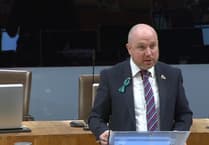Money raised by a proposed visitor levy could be used to plug gaps in cash-strapped public services rather than support tourism as intended, the industry warned.
David Chapman, executive director at UK Hospitality Cymru, said the initial goal of the reforms – ring-fencing funding to improve the visitor experience – has been eroded.
He told the Senedd finance committee: “We have within the proposed legislation, four items of potential spending that are actually removed quite considerably from that original ethos.
“I’ve lived all my life in Wales, we rely on public services, my family rely on public services, we use the health service – we’re all in favour of extra money going into that.
“But the intention of this originally was to try to assist the industry.”
Mr Chapman argued the visitor levy bill is not watertight enough to prevent the revenue raised being used to plug gaps in other areas such as health and education.
As drafted, the bill says proceeds must be used to: mitigate the impact of visitors; promote the Welsh language; support tourism; or improve local infrastructure and services.
Mr Chapman said: “If you are of a mind to fill gaps in budgets and to replace and displace existing spending then those four qualifying areas would allow you to do that.”
Rowland Rees-Evans, chair of the Wales Tourism Alliance, raised concerns about rushing “headlong” into a levy, warning it could cost the economy £40m and lead to 700 job losses.
But he welcomed mandatory registration of visitor accommodation providers under the bill.
Roy Church, co-chair of the Welsh Association of Visitor Attractions, described the bill as a “blunt instrument”, added that it is based on “hopelessly out-of-date” data from 2019.
He told the meeting on 5 February: “The Welsh visitor economy is very different from what’s been looked at in the sessions before this committee.
“We’re not Barcelona, we’re not Venice, we’re not an international destination – our visitors come, 60 per cent nearly, from Wales and the rest mostly from the UK.”
Labour’s Rhianon Passmore asked about comparative taxes across Europe and the proposed rates in Wales, £1.25 a night or 75p for hostels and camp sites.
Mr Chapman replied: “We have 17 different taxes which apply to our businesses.
“We are probably, in fact I’m sure, we are the most taxed sector of any sector.
“We pay three times more than the relevant business rates that we should be paying.”
Zoë Hawkins, chief executive of Mid Wales Tourism, raised concerns about Wales gaining a damaging reputation as an expensive holiday destination.
She questioned comparisons to Catalunya, warning of a 10 per cent fall in tourists to Wales.
Ms Hawkins said: “It’s twice the population of Wales, it’s got 18 million international visitors compared to our 800,000 … we need more visitors into Wales, not less.”
Jim Jones, chief executive of North Wales Tourism, said “Since Covid, it’s gone from bad to worse. We have … over 1,000 members and they are telling us that they are suffering.”




